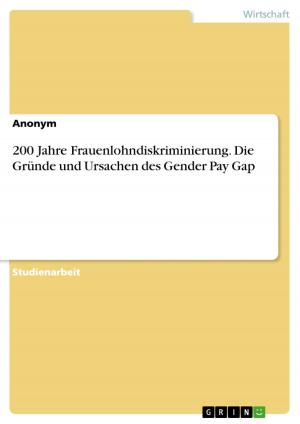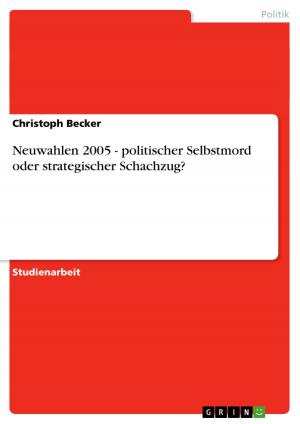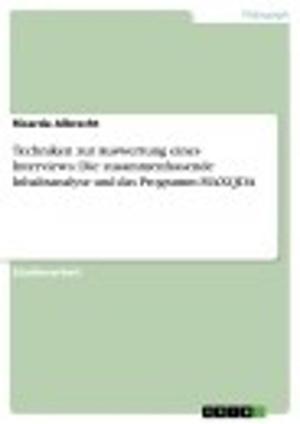The indications of the fillers 'uh', and 'um' in small talk
Nonfiction, Entertainment, Drama, Anthologies| Author: | Chelsea Criez | ISBN: | 9783668252349 |
| Publisher: | GRIN Verlag | Publication: | July 4, 2016 |
| Imprint: | GRIN Verlag | Language: | English |
| Author: | Chelsea Criez |
| ISBN: | 9783668252349 |
| Publisher: | GRIN Verlag |
| Publication: | July 4, 2016 |
| Imprint: | GRIN Verlag |
| Language: | English |
Research Paper (postgraduate) from the year 2015 in the subject American Studies - Linguistics, grade: A, San Francisco State University, course: ENG 425, language: English, abstract: This paper will address the issue of 'uh' and 'um'. The idea for this paper came around while listening to a Teacher's Assistant give a lecture; she had used 'uh' twenty-six times and used 'um' nineteen times (needless to say I do not recall what the lecture was about, nor which class it was for). Then the following questions popped into mind: why do we use 'uh' and 'um'? And why are they so marked? After some research and surveying, I found that 'uh' and 'um' are useful to the speaker as well as the audience. 'Uh' and 'um' are used to let an audience know that there will either be a brief (uh) or a long (um) pause, a hesitation, or a pause for recall which I will show in my data presentation and interpretation. In many studies of uh and um, the conclusions were similar to my findings. Clark and Fox Tree (2002) stated 'that speakers use uh and um to announce that they are initiating what they expect to be a minor (uh), or major (um), delay in speaking. Speakers can use these announcements in turn to implicate, for example, that they are searching for a word, are deciding what to say next, want to keep the floor, or want to cede the floor'. Which I found to be consistent with my findings; a subject tended to continue with their speech almost immediately after using an uh and delayed a few seconds after they had used an um. Clark and Fox Tree found that uh and um had use and are in fact words, 'By words, we mean linguistic units that have conventional phonological shapes and meanings and are governed by the rules of syntax and prosody'. The use of uh and um can be used to alert the audience '(1) that they wouldn't normally expect a delay at this moment; (2) that they anticipated the delay; and (3) that they were aware, at some level, of the reason for their delay'. Clark and Fox Tree were able to prove uh and um have meaning and therefore are indeed words.
Research Paper (postgraduate) from the year 2015 in the subject American Studies - Linguistics, grade: A, San Francisco State University, course: ENG 425, language: English, abstract: This paper will address the issue of 'uh' and 'um'. The idea for this paper came around while listening to a Teacher's Assistant give a lecture; she had used 'uh' twenty-six times and used 'um' nineteen times (needless to say I do not recall what the lecture was about, nor which class it was for). Then the following questions popped into mind: why do we use 'uh' and 'um'? And why are they so marked? After some research and surveying, I found that 'uh' and 'um' are useful to the speaker as well as the audience. 'Uh' and 'um' are used to let an audience know that there will either be a brief (uh) or a long (um) pause, a hesitation, or a pause for recall which I will show in my data presentation and interpretation. In many studies of uh and um, the conclusions were similar to my findings. Clark and Fox Tree (2002) stated 'that speakers use uh and um to announce that they are initiating what they expect to be a minor (uh), or major (um), delay in speaking. Speakers can use these announcements in turn to implicate, for example, that they are searching for a word, are deciding what to say next, want to keep the floor, or want to cede the floor'. Which I found to be consistent with my findings; a subject tended to continue with their speech almost immediately after using an uh and delayed a few seconds after they had used an um. Clark and Fox Tree found that uh and um had use and are in fact words, 'By words, we mean linguistic units that have conventional phonological shapes and meanings and are governed by the rules of syntax and prosody'. The use of uh and um can be used to alert the audience '(1) that they wouldn't normally expect a delay at this moment; (2) that they anticipated the delay; and (3) that they were aware, at some level, of the reason for their delay'. Clark and Fox Tree were able to prove uh and um have meaning and therefore are indeed words.















